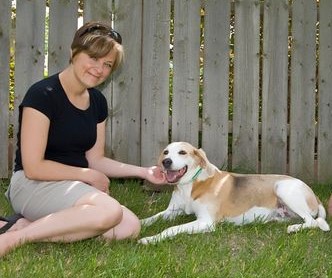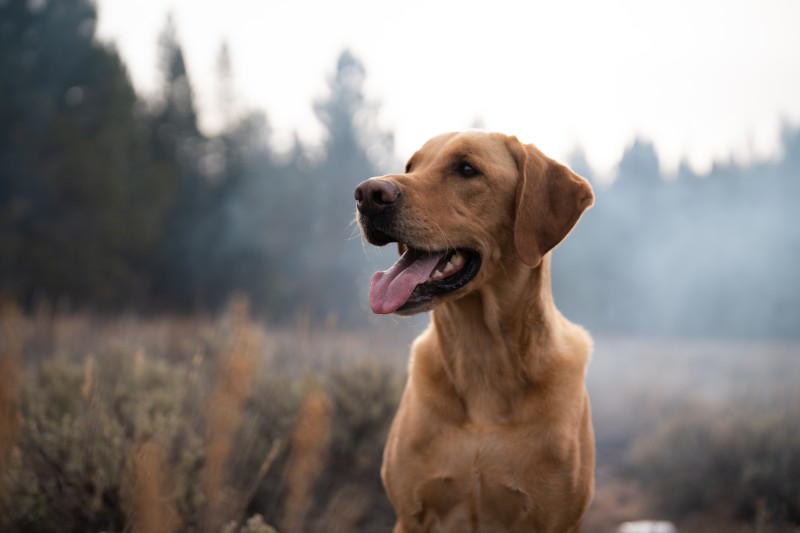
Improving pet nutrition and health is the goal of a University of Guelph animal scientist who has been named as the inaugural Champion Petfoods Chair in Canine and Feline Nutrition, Physiology and Metabolism.
Dr. Anna Kate Shoveller, Department of Animal Biosciences, will also lead a new international research collaboration under a five-year grant from Champion Petfoods based in Edmonton. The new group will study critical pet food nutrition topics and train students for leadership roles in North America’s pet food and nutrition industry.
“The long-term goal of the research I’m leading with the team at the University of Guelph and with Champion Petfoods is to innovate pet food to support the well-being of dogs and cats,” said Shoveller. “We also aim to support the North American pet food industry to be global leaders and to be a safe source of pet food.”
“Our purpose as a company is to earn pet lovers’ trust every day so pets can thrive for a lifetime. Dedicated original research into pet nutrition is what makes that possible,” said Blaine McPeak, CEO of Champion Petfoods, which makes Orijen and Acana pet foods.
“Our collaboration with the University of Guelph and Dr. Shoveller will help ensure that one of the world’s leading research teams has the resources to advance this vital work for the betterment of the entire pet food industry.”
Under the new Champion grant, Shoveller is working with the company’s research and innovation team and with experts at U of G and other institutions in Canada and abroad on aspects of pet diets and nutrition.

Feeding management for dogs and cats is the focus of one collaboration intended to give owners information for better feeding of pets. “We want to not just change the diet but also look at the environment or how the animal is managed and see if we can improve well-being,” she said.
University of Guelph researchers will also work with international researchers on dietary interventions intended to reduce anxiety among dogs and cats.
“Nutrition and behaviour are often intimately related,” said Shoveller. “Changes in pet behaviour can compromise the human-animal bond and could lead to sub-optimal relations between the pet and owner.”
Other research groups will study protein quality in pet foods; fatty acid nutrition; micronutrients in metabolism, health and longevity; and effects of food processing on nutrition.
Besides Shoveller, the research teams include 11 U of G faculty members in the Ontario Agricultural College, the Ontario Veterinary College and the College of Biological Science, as follows:
- Drs. Alexandra Harlander, Wendy Pearson, Trevor DeVries, Niel Karrow, Jim Squires, Mike Steele and Dominique Bureau, all in Animal Biosciences
- Dr. Mike von Massow, Department of Food, Agricultural and Resource Economics
- Dr. David Ma, Department of Human Health and Nutritional Sciences
- Dr. Adronie Verbrugghe, Department of Clinical Studies
- Dr. Iris Joye, Department of Food Science
Other researchers are based at the University of Manitoba and in the United States, the Netherlands and Brazil.

“Champion Pet Foods is the first Canadian company to come in with hefty support of canine and feline research,” said Shoveller.
The research is intended to help not just the pet food industry but also clinicians and pet owners.
Noting that she works with animal behaviourists, she added, “It’s not just about changing diet but it’s also about changing the environment or how the animal is managed and see if that improves well-being.”
Before arriving at U of G, Shoveller worked in the American pet food industry, where she met scientists at Champion Petfoods. Champion has supported her research and grad students since 2016. Shoveller plans to discuss possible internships with the company for U of G students.
“The opportunity to work with industry scientists really helps to elevate U of G graduate student training programs,” she said.
Referring to her senior courses in pet nutrition and advanced equine nutrition, she said, “Our research informs those courses. This research collaboration and relations with industry will continue to inform our teaching and give us the breadth we need to expand the nutrition program at the University of Guelph.”
The research groups plan to apply for matching federal and provincial grants this year.
Shoveller has worked with the pet food industry for almost two decades, leading research and communicating results about topics including protein and energy metabolism and effects of nutrition on behaviour.
Contact:
Dr. Anna-Kate Shoveller
ashovell@uoguelph.ca